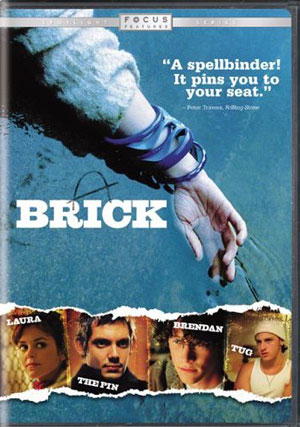 Rian Johnson is a name you need to know. His debut film, Brick, is impossibly assured and great filmmaking, especially when you consider how easy it would have been to fuck up – the movie is essentially a hard boiled noir set in a Southern California high school, where the teens talk like they’ve got Mickey Spillane in their DNA. It sounds like a gimmick but writer/director Johnson is way too talented to let it be one; instead it becomes a sort of revelation, a new way of looking at both noirs and high school movies.
Rian Johnson is a name you need to know. His debut film, Brick, is impossibly assured and great filmmaking, especially when you consider how easy it would have been to fuck up – the movie is essentially a hard boiled noir set in a Southern California high school, where the teens talk like they’ve got Mickey Spillane in their DNA. It sounds like a gimmick but writer/director Johnson is way too talented to let it be one; instead it becomes a sort of revelation, a new way of looking at both noirs and high school movies.
Brick is going to finally hit the kind of audience it deserves this week when it’s released on DVD. You can save yourself a trip to the store by clicking here and ordering it through CHUD, but no matter how you buy it, buy it you must. The disc doesn’t just have the great film, it also has plenty of cool extra features (which Rian talks about in the interview below).
If you’ve already seen Brick, here’s something that’s cool beyond words – earlier this year when I interviewed Rian for the film’s initial release, he mentioned that he had written the story as a novella and turned it into a screenplay. He was considering packaging that up in a book (a book I surely would have bought). Instead, he’s done something very great: he’s made it available for free on his website (click here). And he’s added in the script, complete with annotations. Oh, and there are very cool illustrations in the novella as well. Did I mention this is all for free?
And while you’re at Rian’s site, be sure to check out his message board, which we talk about at the end of the interview. You’re not going to find many directors who are as involved with their fans as Rian is.
Rian gave me a call this weekend, and after some chat about which coast is the best (it looks like we might be swapping sides of the continent), we started talking about his next movie, The Brothers Bloom…
Q: You’re recently back from the UK, right? And you were doing Brick stuff over there?
Johnson: It was half vacation, but I was also out there meeting people for the next movie, which is called The Brothers Bloom. We’re kind of in the middle of casting and money gathering and the process before the process.
Q: There is a website that popped up for The Brothers Bloom in the last few days (click here to see it!).
Johnson: You saw that! It’s just a little teaser site that I put up because I’m a web junkie and a tinkerer. It doesn’t have much on it right now, and I don’t know if anyone has found it – other than you, I guess.
Q: You have some sketches up there.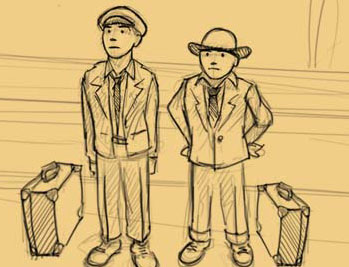 Johnson: Yeah, some storyboards. It’s the first time I’ve ever gotten to work with a professional storyboard artists and I’m so buzzing about. I can’t draw worth shit – actually on the UK version of the Brick DVD I did a little storyboard to scene comparison. It’s pure comedy – you have these little stick figures lines up against an actual image. So for me to work with an actual artist and see the stuff come together, I got pretty excited about it – probably prematurely so – and I tossed a couple of things up on the internet.
Johnson: Yeah, some storyboards. It’s the first time I’ve ever gotten to work with a professional storyboard artists and I’m so buzzing about. I can’t draw worth shit – actually on the UK version of the Brick DVD I did a little storyboard to scene comparison. It’s pure comedy – you have these little stick figures lines up against an actual image. So for me to work with an actual artist and see the stuff come together, I got pretty excited about it – probably prematurely so – and I tossed a couple of things up on the internet.
Q: It looks like you’re working on a period piece.
Johnson: It’s not, actually. It looks that way because of the way the kids are dressed. I think the image on the site are of these two brothers – and the movie is called The Brothers Bloom – and it’s about these two guys who grow up in and out of foster homes as kids and they learn to survive by becoming con men. It starts out with this ten minute sequence of them pulling their first con as kids. It has a kind of Paper Moon type feel to it, that opening sequence. But in the rest of the movie it’s them as adults. It’s not period but it’s very much its own world, if that makes any sense. I think the style of it will owe more to the earlier part of the [20th] century than the later.
Q: That makes sense to anyone who has seen Brick, where you create your own world where they’re driving modern cars and yet talking in this 1940s patter. I’m assuming that Brothers Bloom won’t be that exact same thing, but that same concept.
Johnson: Sort of. I think it’s probably less extreme than Brick in that sense. It doesn’t have the extremely dense patter that Brick had. Brick was extreme in how much it was its own world, but Brothers Bloom is a little more open than that and a little more accessible. But yeah, the same general thing.
It’s weird – in my mind they’re such different movies, but I talk to people who have read the script for Brothers Bloom and then saw Brick and said it made a lot more sense to them after they saw Brick.
Q: You mention Paper Moon. What are some of the other influences on you for this film?
Johnson: The con man genre is one of my favorites, and it’s a weird genre because it’s one that looms large in the minds of cinephiles like ourselves, but when you think about it there are surprisingly few examples of it.
Q: A real handful.
Johnson: Yeah, it’s weird. You’ve got The Sting, obviously, you’ve got House of Games,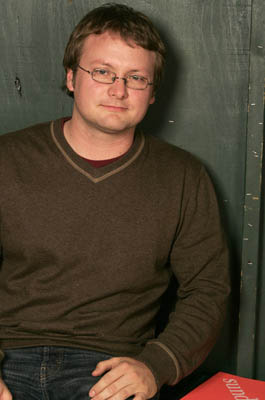 you’ve got Dirty Rotten Scoundrels, which is one that I don’t think usually leaps to people’s minds, but it’s one of the great con man movies out there.
you’ve got Dirty Rotten Scoundrels, which is one that I don’t think usually leaps to people’s minds, but it’s one of the great con man movies out there.
It’s a genre where the big pitfall is the mechanics of the plot overtaking the movie and turning it into a big ‘fooled you’ machine. I think the best examples of the genre and the ones that really endure are the ones that are about the characters. Newman and Redford in The Sting – that’s the reason the movie stuck around as long as it did. And what Mamet did with House of Games in terms of exploring the theme and turning the whole thing into a mind game and making it an intellectual exploration of deception and the con game. That’s what I want to do with this one, to make it a big, fun, elaborate, globe trotting con piece; to not make it a little character piece but at the same time make it about these two guys and make it about the relationship between them. Hopefully at the end of the day what’s going to make it special is the characters.
Q: Have you done a lot of research into cons and grifts in general?
Johnson: It’s been a subject that always fascinated me. There’s a book that The Sting is drawn from, called The Big Con by David W. Maurer. It’s incredible. The guy’s a journalist, and it started out as a linguistic study of the patter of criminals and it turned into this big expose of cons around the beginning of the century. It’s fascinating. It’s amazing. It’s also incredible if you love slang and you love words – it’s like a banquet. The Sting was drawn from that.
But there’s something so alluring about the gentleman thief and the combination of showman and criminal.
Q: And a con man has to be smart. While no one likes to be taken, you have to respect a guy who can pull one over on you like that.
Johnson: Oh, absolutely. You can get fancy and say that’s what we go to the movies for, to have that done to us. That’s one of the fascinating things about con men – there’s a phenomenon that’s well known in the world of cons where they would pull a con over on somebody and forget about the person being angry or coming after to them to kill them, more often than you would think the person would come back to them and want to do it again. There’s this phenomenon of dipping back into the well and taking the same person with a big con multiple times. There’s something that’s built into our nature and it has to do with why we love hearing and telling stories so much. The idea that we should have the excitement that we only hear about in stories is a very seductive thing.
Q: You’re talking about a big globetrotting con man movie. How big are you talking about?
Johnson: It’s big, man. I reached for the ring. I wrote every location I ever wanted to visit into it. It’s kind of ridiculous and it becomes a joke [in the movie]. They’re all over the place – I think there are 12 countries it ends up hopping around to. Which I love – I love movies with that kind of glamour. At the same time it is a bigger film, and it’s probably bigger than I should have written as my second movie! It’s going to be an interesting thing getting it together and getting it funded. It’s not going to be a studio picture, it’s not going to be a big budget thing, but it’s probably a little bigger than would be comfortable for a little known second time director to get going.
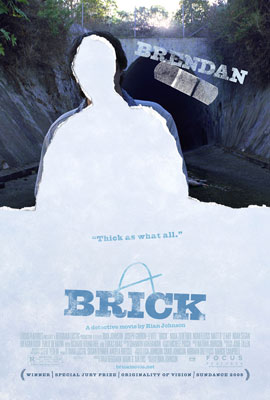 Q: I’m curious about how you’re approaching your second feature. The sophomore slump is a cliché, but it seems especially real in the film world, where so many indie directors break out with their first film and stumble with the second. Richard Kelly is dealing with that right now with Southland Tales. What are you doing to avoid that?
Q: I’m curious about how you’re approaching your second feature. The sophomore slump is a cliché, but it seems especially real in the film world, where so many indie directors break out with their first film and stumble with the second. Richard Kelly is dealing with that right now with Southland Tales. What are you doing to avoid that?
Johnson: I’m not sure how to answer that. To a certain extent I don’t think you can look that problem in the eye and do something productive about it. I think you have to pick up the pen again and do something that genuinely interests you make it the best work that it can possibly be. I think if started thinking in those terms I would go a little crazy and probably make a piece of shit.
With Brick, as incredibly proud as I am of it and everyone’s work on it and the finished product and to see it find its segment of the audience, but at the same time I wrote that script nine years ago. For me it wasn’t like, ‘Holy crap, what am I going to do next?’ At this point I’m bursting with ideas, and it feels really good to be working on something I wrote just this year that’s connected to where I am in my life right now and deals with stuff that I’m dealing with. I’ve never had a more invigorating experience than working on this next one.
Q: Why go indie again? I’m assuming you could be taking meetings at studios and taking offers, so why go independent?
Johnson: I just really don’t have any interest right now in doing studio work or being a director for hire or doing other people’s material or selling my material for other people to do. Right now I’ve got a couple of stories in my head and I want to be able to tell them in my own way. I want to be able to make my own movies. Maybe down the line that can happen with a studio, but right now it seems like it would be more difficult. Staying indie and staying indie for the time being makes sense.
I look at the filmmakers whose career trajectories I really admire – you look at the Coen Brothers or Paul Thomas Anderson or Aronofsky and you see these people who have made their own stuff and be able to stay true to that. They all stay relatively small; that seems to be part of the equation. I’m completely thrilled to do that.
Q: Has Brick opened a lot of doors? When you’re trying to get financing for The Brothers Bloom does having the calling card of a successful film make a big difference?
Johnson: Oh my God, the difference between trying to get Brick together to trying to get this together is almost night and day. It’s surprising to me how much easier [Brick] has made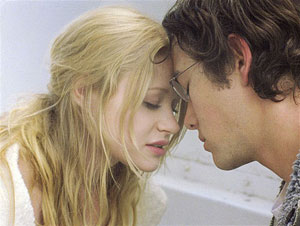 it. At the same time it’s still a process, and Brick was still a small, weird little movie and you still have to fight the good fight to get the next one going. But yeah, it’s been kind of a pinch myself experience, seeing the people who are interested in working on the next one, and seeing that there are people coming to us who are interested in it. It’s utterly bizarre.
it. At the same time it’s still a process, and Brick was still a small, weird little movie and you still have to fight the good fight to get the next one going. But yeah, it’s been kind of a pinch myself experience, seeing the people who are interested in working on the next one, and seeing that there are people coming to us who are interested in it. It’s utterly bizarre.
Q: Is there a time frame for Brothers Bloom yet? Do you know when you want to start shooting?
Johnson: We’re going to shoot at the beginning of next year, which makes it’ll probably be coming out in [2008].
Q: Brick is hitting DVD this week. What’s it like putting together your first DVD?
Johnson: I had a lot of fun with it. The process was more rushed than I thought it would be – I didn’t realize that basically we had to get all the stuff for the DVD done by the time the movie opened. It’s such a quick turnaround from theatrical to DVD, which is great, I think.
I had a blast, though. The fun thing is that the extras that are on the disc I put together the same way I put together Brick – I cut them at home on my Mac, using the hard drive that still had all the footage on it. It was fun; it felt like a continuation of the homespun process that Brick was born out of.
Q: What are some of the features on the DVD?
Johnson: The US disc has a commentary track that I did with our production designer, our costume designer, our producer and a couple of the actors – Nora Zehetner and Noah Segan. That was totally terrifying for me, mostly just because I’m not a big fact of commentary tracks.
Q: Really?
Johnson: Yeah, I know. It seems like the kind of thing I would be into, but more often than not – and you occasionally hit a good one – but more often than not… my theory on it is that the process of it is one that is slightly flawed. If you ask a professional comedian how long it takes to put together enough material to be interesting to an audience for two hours, they’ll say months and months. And yet you’re taking a filmmaker like myself – who is not a performer at all – and plunking them down in front of a microphone and asking them to talk for two hours about this movie on the screen and be interesting. I think it’s a lot harder than it looks, so I was really daunted coming into it. I hope it comes off just shy of embarrassing. There are a couple of auditions. The centerpiece of the US disc is this segment that I cut together of deleted scenes, but it’s a little bit more than that. Each scene is introduced with a mini-commentary as well as some still photos of the shoot. What I tried to do was, because Brick was worked on so much in the editing in terms of cutting it not just for length but for clarity, so I tried to put a series of deleted and extended scenes on there and use each one to make a point about the editing process. Hopefully it’s a little segment that takes you through the cutting process on the movie, showing you how that affected the end product.
There are a couple of auditions. The centerpiece of the US disc is this segment that I cut together of deleted scenes, but it’s a little bit more than that. Each scene is introduced with a mini-commentary as well as some still photos of the shoot. What I tried to do was, because Brick was worked on so much in the editing in terms of cutting it not just for length but for clarity, so I tried to put a series of deleted and extended scenes on there and use each one to make a point about the editing process. Hopefully it’s a little segment that takes you through the cutting process on the movie, showing you how that affected the end product.
Q: Is the cut of Brick on the DVD the director’s cut, or will we one day see these scenes put back in the movie?
Johnson: No, I don’t like the whole notion of director’s cuts. The version that went out there was the director’s cut, and the scenes that were cut out were definitely cut out for a reason. That’s always the fun thing of watching DVDs, is when you see those deleted scenes you can nod your head and say, ‘I can see why those went.’
Q: Are you surprised by how deeply Brick hit? There’s a real fanbase for this movie.
Johnson: Absolutely. I don’t know how to articulate how deep the surprise went. You have to go back to my surprise that we even got into Sundance and that we even got released and that people saw the movie at all. We were really taken by surprise because of the way we made the movie. It was made as a microbudget movie and made totally independently; we kind of went off into the corner and made this little thing without any grownups looking over our shoulder. When we finally brought it out to show it to everyone we had no idea what to expect – it was like emerging out into the sunlight, and it was totally terrifying.
The fact that people who have been into it have been into it so much and have really connecting with it is so satisfying. I started up this message board, this forum, on my own personal site, for the movie, for people to come and talk about the movie whether they liked it or not and to ask questions. I’m on there all the time – I answer questions, I talk to the people, I’ve gotten to know a lot of the people who are really into it. For me that’s been the most incredible part of this process, getting to connect with filmmakers and film watchers out there and hear their perspective on the movie, hear why they connected with it or didn’t. Another cool thing is the opposite end of the spectrum – while there are people who passionately love the movie, if it’s not their cup of tea there are people who can really passionately hate it. It’s even more fun sometimes.
Q: One of the most important things about modern filmmaking to me isn’t stuff like digital films but the ability for filmmakers to get in touch with their audience, like what you’re talking about with the forum. Just ten years ago this would have been pretty much unheard of – people would have to rely on a jerk like me talking to you on the phone and writing everything down to get to know how you feel about stuff. Now they can go right to you. How does that affect you as a filmmaker, being so in touch with the audience?
much unheard of – people would have to rely on a jerk like me talking to you on the phone and writing everything down to get to know how you feel about stuff. Now they can go right to you. How does that affect you as a filmmaker, being so in touch with the audience?
Johnson: I don’t know. Ask me in a few years, I guess. [laughs] It’s interesting, I was having a conversation with a musician who had a message board on his site. He had looked at the Brick message board and he was commenting on how amazed he was that I interacted so much. He said that he may have done that at first, but then he found it was healthier as an artist to not talk about the actual stuff with the fans. It tends to have unforeseen effects. But at the moment I don’t see any unhealthy effects from it at all. It’s something I just really enjoy.
Like you mentioned before it’s possible for the filmmakers to connect with the audience. It’s rare enough that people are surprised that I’m on there and actually answering stuff, which is weird to me, just considering the nature of the internet. I guess it’s something that doesn’t happen all that often. It’s made for some interesting reactions. There have been moments on the forum where someone posts the type of rant you might see on the IMDB forums or on a TalkBack where people think it’s totally anonymous and all of a sudden I reply back. They suddenly become twenty times more thoughtful and start engaging in a conversation – it’s beautiful actually. It’s kind of cool.
Q: And there’s got to be a fiscal aspect – by communicating you’re creating a fanbase who will feel very connected with your work. They’re going to turn out to see your next movie because they feel personally connected to you.
Johnson: I hope so. Like I said, the exciting thing is creating that kind of community. Growing up as a film fan and directors specifically that was an important part of my youth – following the people you are fans of, people whose work you enjoy and admire. And on the other hand I’m becoming a fan of the people on the forum – people send me links to their shorts and stuff, so it’s been fun for me as well.